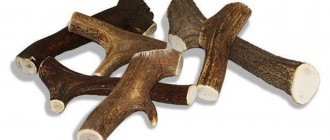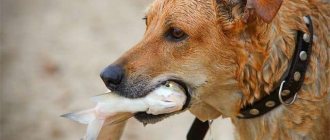Cheese is a popular fermented milk product with high nutritional value. It contains proteins, milk fat, mineral elements, vitamins, and extractives. This product brings undoubted benefits to the human body. This product is not typical for the diet of animals living in the wild. But domestic dogs eat differently, in accordance with their lifestyle. From this article you will find out whether dogs can have cheese and whether this product is healthy for them.
Is it possible or not - that is the question
Many dog owners don't think twice about giving their pet a piece of cheese as a treat. As a rule, an animal living under the same roof with a person will sooner or later try the entire diet of its owner. And who would deny their pet a treat, especially if he asks for it.
Veterinarians say that you need to be careful in this matter, because not all varieties of the product will benefit the animal. Almost all dog trainers actively use it as a reward for a correctly or well executed command.
On a note! A small piece of hard cheese with low fat content and no salt will not harm your pet. In large quantities, it can cause an allergic reaction in the body.
Can puppies have cheese?
Cheese should not be given to puppies under 1 year of age. For a young body, such a product will become poison. It is recommended to start accustoming puppies to the product only after their food system is fully formed, i.e. after a year.
Is it possible for lactating and pregnant women
It is not advisable to give cheese to females bearing or nursing their offspring. However, it often happens that after giving birth, the animal’s calcium levels in the body may drop sharply. In this case, the female herself will ask for a piece of cheese if she smells it.
On a note! A lack of calcium in the blood of a lactating bitch is a reason to contact a veterinary clinic for examination.
Breed characteristics
Some types of dogs are more susceptible to allergic reactions. Beef lung is an allergenic product, so it is not recommended for representatives of the following breeds:
- French and English bulldogs;
- East European Shepherds;
- Dalmatians;
- Shar-Pei;
- American Staffordshire Terriers.
But this does not mean that offal is generally contraindicated for these breeds. You can mix a small amount of lung with the food. If after this there are no changes in the behavior and health of the pet, the product can be introduced into the diet, taking into account the recommendations of the veterinarian.
What kind of cheese can you give to dogs?
When buying cheese for your dog, you should pay attention to varieties with low fat content. High-quality cheese should not contain palm oil, any chemical additives, flavorings or flavor enhancers.
Choose a product that is a solid variety that does not contain salt or lactose. List of cheeses allowed for dogs:
- Dutch;
- Russian;
- Radamer;
- Adyghe;
- Sumushtino;
- Rothaler et al.
On a note! The maximum fat content of cheese should be no more than 30%.
What kind of cheese should you not give to dogs?
All other cheeses that are not hard varieties, high-fat or elite varieties are prohibited for dogs. These include those listed in the table:
| Cannot be given to dogs | Examples of cheeses | Reasons for the ban |
| Processed cheese and curds | Friendship, Amber, Nadezhda, Wave, etc. | Does not apply to hard varieties. The thick viscous consistency is difficult to digest in the dog's stomach. Causes indigestion and constipation. It spreads across the walls of the stomach and clogs it. Contains preservatives, palm oil, salt and spices. |
| Blue cheese | Roquefort, Gorgonzola, Epuas, Dor Blue, Camembert, etc. | Mold contains toxins that can cause poisoning in animals. Symptoms of intoxication will not take long to appear: nausea, vomiting, refusal to eat. High calorie content and lots of fat. |
| Pickled cheese | Suluguni, Feta, Brynza, Mozzarella, Ossetian, Chanakh, etc. | These types of cheese contain a large amount of salt added during its production, which is harmful to the dog. Poorly absorbed in the body. |
| Sausage cheese, braid or smoked cheese | Amber, Smoked. | Any smoked products contain a high percentage of fat content. In addition, the substances used for cold smoking can be fatal to your pet. |
| Deli cheese | Camembert, Le Blue, Chechil, Babybel, Roemer, etc. | The fat content of this cheese is more than 60%, which is already contraindicated for dogs. Spices and additives are added to gourmet cheeses and are not recommended for animals. |
Important! Under no circumstances should you give a cheese product to animals; it is harmful not only to humans, but also to pets. Contains a lot of preservatives, palm oil, chemicals, spices, salt. Essentially, the cheese product is not real cheese.
Why do proponents of a raw food diet recommend it?
People who support the idea of feeding raw foods and avoiding conventional processed foods often cite the quality and composition of cooked foods. They claim that the content of meat and other important products that make up dog foods can be highly variable or of poor quality.
In addition, proponents of feeding dogs raw meat believe that both dry and canned food are very different from their natural diet in the wild, and that this type of diet is not as healthy for dogs as one that is more similar to their food in the wild. normal conditions in nature.
Raw food is usually produced by the dog owner himself, so he knows exactly what kind of food it is, where it comes from and what quality it is. Additionally, the diet can be tailored to meet the needs of a dog with specific allergies or other dietary restrictions. Raw foods do not require any of the preservatives or additives typically found in processed foods, and bones and fiber-rich plant foods can be beneficial in maintaining healthy teeth and gums.
How to give cheese correctly and how much
Cheese is a product that is not included in the daily staple diet of a dog. It is used more as complementary food, to disguise a pill or as a treat for a well-done command. Thus, the animal perceives cheese not as ordinary food, but as a special treat.
In order not to harm the dog, cheese must be given correctly:
- Cut it into small cubes: 1x1 cm for small dogs, 2x2 cm for medium ones, and 3x3 cm for large breeds.
- Lightly dry the cubes in the open air for 3-4 hours so that they do not stick to your hands.
- You cannot throw cheese into the air, giving the dog the opportunity to catch it. This could cause her to accidentally choke.
- The best way to give your pet cheese is from your outstretched hand. This way you show special attention to her.
On a note! If your dog is not accustomed to taking food from your hands or you are afraid that he will bite your fingers, then simply place a piece of cheese in front of him and call him. The animal will appreciate your care.
Depending on the breed, the amount of cheese at one time can vary significantly. How much to give:
- for small dog breeds, a single dose should not exceed 5-10 g;
- for dogs of medium breeds - 25-30 g, which is equal to the amount eaten by a person with one sandwich;
- for large breeds it is permissible to give up to 50-70 g of cheese at one time.
The number of pieces for one treat should not be more than 2 pieces.
The benefits of cheese for dogs
Natural fermented milk products are necessary for dogs, as well as for humans. These do not include milk as it contains lactose, which is poorly digestible by animals.
Cheese contains a large amount of essential nutrients that compensate for deficiencies in the body:
| Ascorbic and nicotinic acid | They take part in metabolic processes in the body. |
| Vitamins D and group B, retinol | Helps improve the appearance of the animal's fur and skin. |
| Calcium and phosphorus | Improves the condition of bones, joints, tendons |
| Magnesium and zinc | Affects the nervous system, calms |
| Copper and iron | They take part in blood formation, strengthening the walls of blood vessels and capillaries. |
| Protein | The main component for the structure of muscle tissue. |
The dog receives the same benefits for the body by eating meat daily. However, to diversify the diet, cheese is given in small portions.
Harm and contraindications
Despite the benefits of cheese for dogs, this product has its contraindications for some individuals. The product should not be given if your pet has:
- gastrointestinal diseases such as gastritis, peptic ulcer, colitis, etc.;
- pronounced lactose intolerance;
- diseases of the pancreas or liver: cirrhosis, hepatitis, ascites or pancreatitis;
- obesity, the dog leads a sedentary lifestyle;
- there is intolerance to the product and an allergic reaction to it;
- The dog has recently undergone surgery, such as castration.
Cheeses that contain a lot of milk fat, salt, flavor enhancers, flavorings or preservatives are especially harmful to pets. They cause a load on the gastrointestinal tract in the body and provoke:
- bloating;
- vomiting and nausea;
- diarrhea;
- reduce appetite;
- an allergy to the product manifests itself: itching, irritation of the skin, swelling of the mucous membranes, suffocation or shortness of breath.
What to do if your dog ate prohibited cheese
If a dog accidentally ate a small piece of forbidden cheese once, there will be no obvious harm to it. However, salts and harmful substances in the product have an accumulative property. Therefore, with systematic consumption, side effects may occur: nausea, vomiting, diarrhea.
Important! If you suspect that your dog has eaten harmful cheese, then give it an absorbent, for example, activated carbon (at the rate of 1 tablet per 1 kg of weight), and leave a gap between meals.
If an allergic reaction occurs: itching, redness of the skin, swelling of the nose, eyes, etc., consult a doctor immediately.
Who is prohibited?
You should not give cheese to dogs suffering from any liver problems : hepatitis, liver pathologies (acute pancreatitis), toxic liver degeneration, cirrhosis, ascites. This delicacy is also contraindicated if the dog is obese, has problems with the pancreas, or has low mobility.
If the pet is weakened, has recently undergone surgery or a trip, or has temporary digestive problems, then there is no need to give cheese just yet , like any other exotic treat.
Chihuahuas, Spitz and Yorkshire Terriers
Cheese can be given to any breed, there are no restrictions. The only thing is that for small breeds it will be difficult to calculate the correct dose.
also cause food allergies in dogs . Its symptoms:
- frequent bowel movements;
- irritation on the face, paws, ears, around the anus;
- constant scratching;
- in later stages – hair loss.
If you have an allergy, you should immediately stop giving cheese and never try to feed it to your dog again.
Can dogs have cottage cheese as a type of cheese?
Cottage cheese contains a large amount of calcium, which is so necessary for dogs. With daily use, the condition of your pet's teeth significantly improves, bones and joints become stronger. Cottage cheese is especially useful for small puppies and pregnant females during the period of feeding the brood.
When purchasing, choose cottage cheese with the lowest fat content. Homemade fried cheesecakes, cheesecakes with cottage cheese or dumplings will not bring as much benefit as fresh cottage cheese without additives or preservatives.
Store fresh cottage cheese in the refrigerator close to the freezer. On the third day, you can no longer give such cottage cheese to dogs.
Is it possible to train a puppy?
Of course, training a puppy is one of the most important aspects of owning a dog. The upbringing and socialization of a dog are the basis of its existence in our society. However, you should not rush to attach certain commands to the puppy’s actions. The most important thing is the puppy’s willingness to work, his interest in you and while spending time with you. To begin with, it is worth establishing “contact” between you and your pet. If the dog is passionate about the owner, any commands will be easily learned and subsequently carried out consistently.
Questions and answers
We answer questions from our readers.
Can a dog be allergic to cheese or cottage cheese?
Animals, like people, have individual characteristics of their bodies. Some people love cheese, while others have an allergic reaction. So, yes, dogs can also be allergic to cheese or cottage cheese.
Is it possible to give a dog cheese if it is poisoned?
If poisoning is suspected, it is necessary to completely exclude any food from the animal’s diet, including cheese. In this case, you can only give water.
Is it possible to have cheese after a vaccine or vaccination?
After any surgical operations, vaccinations, or during the treatment of diseases, it is necessary to limit the intake of cheese for the dog. Her body is under stress from medications, so there is no need to aggravate the pet’s condition.
What can you replace cheese with?
You can make up for your dog's nutritional deficiencies with other foods. For example, cheese can be replaced with apples, bananas, allowed berries or fruits. Manufacturers have provided a range of treats for pets, which can be purchased at a specialty store. These are various bones, braids of meat tendons, dietary cookies and much more.
As you can see, you can give cheese to dogs. However, not all varieties are suitable for feeding animals. Choose only a high-quality product, with the least amount of salt, fat and food additives. Use a small piece of cheese as bait or reward for your pet.
What signs indicate that the product is not suitable for your pet?
All dogs are individual; individuals of the same breed and age can react differently to the same product. Cheese is not suitable for your pet if after eating it:
- Problems arise with the gastrointestinal tract. Diarrhea, frequent stools, or, conversely, constipation may occur after consuming fatty or processed varieties.
- Allergy symptoms appear: itching, redness of the skin (most often observed on the ears, face, paws, and around the anus).
If you don’t notice that after eating cheese your pet develops an allergy and constantly treat it with treats, the condition will become protracted. Constant itching will cause hair loss and bald spots. Scratching the skin is an open path for infection. Excess allergen can cause anaphylactic shock.
Cheese causes a reaction in dogs more often than chicken. This is the second most popular allergen (beef comes first), so the product is introduced into the diet carefully and gradually.
If a reaction occurs to one type of hard cheese, you should not try other varieties. Their compositions are similar.
After considering the different types of foods, it becomes clear why dogs should not have some cheese, and why caution must be exercised. If your pet loves a treat and responds well to it, do not deny it to him, but remember the safety precautions: “the best is the enemy of the good.”











